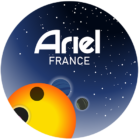Temperate exoplanets: Studies with JWST and ARIEL observatories
The thesis will be hosted at the Groupe de Spectrométrie Moléculaire et Atmosphérique of the Université Reims Champagne Ardenne in France, under the supervision of Dr. Panayotis Lavvas (email : @univ-reims.fr) The thesis can start as early as October 2024.
With the advent of James Webb Space Telescope (JWST) and the forthcoming launch in 2029 of the Atmospheric Remote-sensing Infrared Exoplanet Large-survey (ARIEL) our ability to characterise exoplanetary atmospheres is drastically expanding. Clear demonstrations of this new capacity come from the JWST observations of the atmospheres of hot-Jupiter WASP-39b. These phenomenal precision and resolution observations demand detailed simulations of atmospheric physical and chemical processes for their interpretation. The thesis will build on an already developed, self-consistent code that couples between atmospheric dis-equilibrium chemistry, haze and cloud microphysics, and radiative/convective energy transfer (Arfaux & Lavvas 2022). This unique tool, allows for an in depth investigation of the involved processes that is out of reach for the more heavy general circulation models, and can thus provide a fast interpretation of observations, as well as, identify topics that should be further explored with GCMs. Our so far application of this tool to JWST observations has revealed the important interplay between haze and clouds in the atmosphere of WASP-39b and helped explain the available transit observations of this atmosphere (Arfaux & Lavvas, 2024). The goal of this thesis is to expand the atmospheric characterisation and the investigation of haze and cloud formation, focusing on temperate (300K<Teff<500K) exoplanets. This family of exoplanets is becoming observable with JWST and also with ARIEL. Its study will allow to understand the physical processes occurring at these temperature conditions that are intermediate to those found in our solar system and the warmer hot-Jupiters. This field is a topic of investigation mentioned in the 2023-2032 Decadal Survey for Planetary Science and Astrobiology, and are also one of the themes of ESA’s Voyage 2050 L4 roadmap. Within the scope of this thesis is the exploration of machine learning techniques that could be applied for accelerating the model output.
Arfaux & Lavvas (2022) MNRAS, 515, p.4753-4779.
Arfaux & Lavvas (2024) MNRAS, 530, p.482-500.
Profile and required skills:
We are looking for a PhD fellow who will be able to become fully involved with the project, with a thirst for knowledge, a certain independence of thought and strong motivation to develop skills in the field of planetary sciences. The candidate must have a Masters degree demonstrating a strong background in physical sciences and numerical simulations. Background in astronomy / astrophysics is envisioned. The post requires a high level of communication skills, both oral and written (French and English required) to be able to interact with colleagues, present at conferences, and write articles in scientific journals. A sound knowledge of computer languages is necessary.
Applications must include a detailed CV; at least two references (people who may be contacted); a cover letter of one page; a one-page résumé of the dissertation for the Masters; grades for the Masters 1 or 2.
The closing date for sending applications is 10/06/2024.
